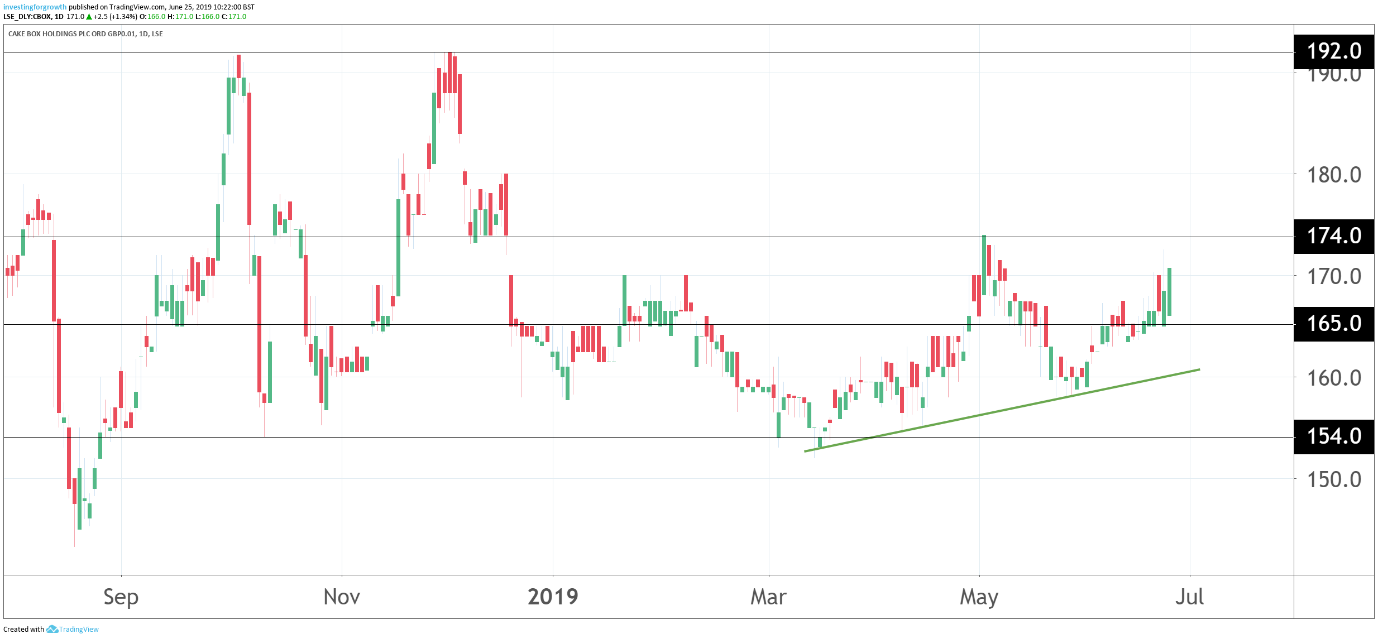Stockwatch: A solid share for investors with taste
Swallow a rivals' scandal because this company has better financial substance and still rates a 'buy'.
25th June 2019 10:48
by Edmond Jackson from interactive investor
Swallow a rivals' scandal because this company has better financial substance and still rates a 'buy'.

Can this AIM-listed retailer of fresh cream, egg-free cakes withstand pressures on consumer spending from Brexit, and investor wariness after the demise of AIM-listed Patisserie Holdings?
Just after the Serious Fraud Office (SFO) arrested five people previously linked to the finance function at the Patisserie Valerie chain, Cake Box Holdings (LSE:CBOX) has declared maiden annual results to 31 March 2019. Pre-tax profit rose 19% to £4 million (shorn of listing costs and a fair value uplift) on revenue up 33% to £16.9 million, with normalised earnings per share (EPS) up 14% to 7.9. The dividend is hiked 50% to 2.4p.
The earnings outcome is short of my estimate for EPS of 9p when drawing attention to the stock as a 'buy' last September at 163.5p, although a 9 April 2019 update had cited profit in line with market expectations.
Cake Box floated last June at 108p with market price kicking off in a 160p range; it twice tested 190p last autumn despite the markets' slide and, at around 170p currently, trades on 21.5 times latest adjusted EPS – a multiple that should ease with underlying growth in the current financial year, possibly to the high teens.
That's justified given substantial scope to roll out the concept across the UK, with strong margins supporting a cash generative model. A 23.7% operating margin (minus a fair value movement) is down from 26.5% in the last financial year as administrative expenses rose from 17.8% to 22.1% of turnover (despite AIM listing costs being a separate, £600k exceptional item) but remains attractive. Cake sponge profitability improved due to better production efficiency after new ovens were installed.

Source: TradingView Past performance is not a guide to future performance
Balance sheet conveys well-managed growth
In contrast with Patisserie Holdings chronically delaying payments to suppliers, and assuming Cake Box's accounting is fair, then trade payables as a percentage of turnover have reduced from 11.7% to 9.1% and were exactly in balance with trade receivables as of 31 March 2019.
Credit to Cake Box's CFO for actually noting trade payables at all in his financial review - flagging a 2.6% increase - although I’d take more notice of its trend decreasing relative to turnover. Typically, I wade through extensive detail in results’ statements that fails to explain huge trade payables versus trade receivables.
Since this is an organic growth not acquisitions-led company, there's no accumulating goodwill/intangibles to pervert reported profits, and £2.1 million debt (principally long-term) compares with £3.1 million cash (up 23%) thus conveying sound financials with means to grow. Net finance costs were covered 107 times by operating profit, hence the company can withstand even a sharp deep downturn.
Return on equity is a very attractive 45.3% (£3 million post-tax profit versus shareholders' funds of £6.6 million) or 34.2% for total capital employed, another sign expansion won't need a lot of debt.
To be fussy: note 7 on finance costs, cites £2,682 interest on overdue tax (note 7, finance costs) otherwise finances are exemplary. The chief question for investors is whether Cake Box's marketing concept has longevity and can possibly be refreshed to maintain tease.
| Cake Box Holdings: consolidated income statements | ||||
|---|---|---|---|---|
| year to 31 March | ||||
| 2019 | 2018 | 2017 | 2016 | |
| £ | £ | £ | £ | |
| Revenue | 16,908,999 | 12,739,484 | 8,664,036 | 5,592,012 |
| Cost of sales | -9,189,297 | -7,263,209 | -5,015,429 | -3,037,963 |
| Gross profit | 7,719,702 | 5,476,275 | 3,648,607 | 2,554,049 |
| Administrative expenses | -3,742,684 | -2,273,128 | -1,661,583 | -1,339,406 |
| Other operating income | 27,719 | 178,175 | 333 | 0 |
| Fair value movements | 444,148 | 0 | 0 | 0 |
| Operating profit | 4,448,885 | 3,381,322 | 1,987,357 | 1,214,643 |
| Finance income | 6,981 | 1,114 | 22 | 713 |
| Finance costs | -45,833 | -46,786 | -63,267 | -45,902 |
| Profit before tax | 3,808,706 | 3,335,650 | 1,924,112 | 1,169,454 |
| Tax expense | -806,290 | -568,053 | 298,879 | 105,070 |
| Profit for the year | 3,002,416 | 2,767,597 | 1,625,233 | 1,064,384 |
Customer reviews still somewhat divergent
Last September, I suggested a key attraction was that enough Brits are obsessed with cake – see the success of "Bake Off" shows – and is likely a more significant factor in demand than Cake Box's original reason for founding: how British Indians could not find egg-free commercial cake as required by Hindus.
Britain has been declared "the fattest country in Europe" with 27% of its population over the official definition of obesity. Is this really going to change? I rather doubt it.
I was still concerned, having scrolled through customer reviews, that they were often polls apart – "Excellent" or "Terrible" – with a consistent complaint of sponge being dry and occasionally grainy (one might expect due to lack of egg?) and page 6 of the listing particulars had been drafted carefully: "the directors believe egg-free has no effect on taste or texture..."
More recent reviews (albeit February 2019 and earlier) reiterate such issues - 23 "excellent", 4 "very good", 4 "average" and 12 "terrible" as regards the Gravesend outlet. Complaints are fairly consistent: that the sponge can be dry but you might not notice anyway, with so much cream, and colourings tend to stain hands.
Just lately the company's Facebook page has declared a new range of vegan loaf cakes "coming soon", which is encouraging for keeping attuned to dietary trends. If Cake Box can diversify its offering, it might result in less polar attitudes.
Investors may recall how Greggs' (LSE:GRG)' introducing a vegan sausage roll delivered a 10% sales boost earlier this year, though involved canny PR and a stroke of luck – journalists sent vegan rolls in mock iPhone packaging and stores selling sausage roll phone cases – that prompted Piers Morgan into a dismissive tweet, exploding publicity.
Otherwise, "personalised cakes" can have a flavour of discretionary spending that could be compromised by a more serious downturn; which would also likely hurt all small cap stocks as a liquidity preference kicks in. If the price/earnings (PE) ratio was higher I'd be more cautious.
It's also possible people will refuse to compromise against celebration cakes as a bit of indulgence and cheer, so I wouldn't over-emphasise macro risk. At least there haven't been any complaints sparked in the media (that I'm aware of) of illness, given fresh cream is highly perishable.
Average franchise store revenue rises 18% year-on-year
A franchise-based business model appears to be proving itself, with occupiers incentivised. The estate has grown by 27 stores to 113, which compares with some 200 Patisserie Valerie around its peak. New owners there have cut back outlets, but obviously that company has been in dire financial straits linked to wrong-doing.
Cake Box reckons on plenty opportunity in Scotland and Wales where it has barely started, so I'm optimistic as to scope on say a three-year view. The target is to open an average six new franchise stores per quarter, where four have been opened since April and two are due by end-June.
To serve expansion, two new warehouse and distribution centres are being opened to complement existing facilities in Enfield, reducing delivery time to within 90 minutes for 95% of stores.
Commercial director adds to a sizeable stake
In March and April, the commercial director bought three lots of just over 3,000 shares at prices around 160p for his SIPP, to own 551,012 overall. Some of that could have been acquired very cheaply early on, but it's encouraging to see a director acquire equity on the same terms as outside investors and tuck it away in his SIPP, rather than via a fancy scheme devoid of risk.
It's also a sign of longer-term confidence in the business plan, he has seen fit to raise an already large holding in a small cap that it would be difficult to sell down if progress disappoints.
Public taste and discretionary spending remain inherent risks that you can't accurately predict, and Cake Box's chief offering clearly doesn't please everyone. Yet its results prove good momentum under an attractive financial model, a company that's now established yet with plenty nationwide mileage, and a stock rating that isn't exposed. A hard Brexit could result in better prices to accumulate but, overall, I reiterate my stance: Buy.
Edmond Jackson is a freelance contributor and not a direct employee of interactive investor.
These articles are provided for information purposes only. Occasionally, an opinion about whether to buy or sell a specific investment may be provided by third parties. The content is not intended to be a personal recommendation to buy or sell any financial instrument or product, or to adopt any investment strategy as it is not provided based on an assessment of your investing knowledge and experience, your financial situation or your investment objectives. The value of your investments, and the income derived from them, may go down as well as up. You may not get back all the money that you invest. The investments referred to in this article may not be suitable for all investors, and if in doubt, an investor should seek advice from a qualified investment adviser.
Full performance can be found on the company or index summary page on the interactive investor website. Simply click on the company's or index name highlighted in the article.
Disclosure
We use a combination of fundamental and technical analysis in forming our view as to the valuation and prospects of an investment. Where relevant we have set out those particular matters we think are important in the above article, but further detail can be found here.
Please note that our article on this investment should not be considered to be a regular publication.
Details of all recommendations issued by ii during the previous 12-month period can be found here.
ii adheres to a strict code of conduct. Contributors may hold shares or have other interests in companies included in these portfolios, which could create a conflict of interests. Contributors intending to write about any financial instruments in which they have an interest are required to disclose such interest to ii and in the article itself. ii will at all times consider whether such interest impairs the objectivity of the recommendation.
In addition, individuals involved in the production of investment articles are subject to a personal account dealing restriction, which prevents them from placing a transaction in the specified instrument(s) for a period before and for five working days after such publication. This is to avoid personal interests conflicting with the interests of the recipients of those investment articles.